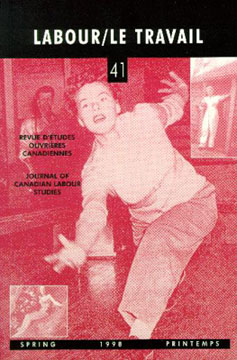Abstract
In the 1920s and early 1930s the Industrial Workers of the World were a force to be reckoned with among Finnish bushworkers in northern Ontario. Although the Lumber Workers Industrial Union no. 120, affiliated with the Industrial Workers of the World, was smaller than its rival, the Lumber Workers Industrial Union of Canada, affiliated with the Communist Party, the Wobbly union played a major role in bushworker strikes in the mid-1920s and early 1930s. Committed to anti-authoritarianism, decentralization, and rank-and-file initiative, Finnish Wobbly bushworkers were part of an ethnic-based working-class culture in which the economic struggles of the bushworkers were made possible by the tireless work of Finnish Wobbly women, who were the backbone of Wobbly social, cultural, and organizational life in urban centres like Port Arthur. In a 20th century dominated by bureaucracy, legality, and state-directed social programs, the Finnish Wobblies of northern Ontario leave a legacy of dedication to self-education and self-activity in an age so often identified with the demise of the Wobblies and the victory of mass culture.
Résumé
Au cours des années 1920 et le début des années 1930, l'lndustrial Workers of the World (IWW) a constitué une force importante parmi les travailleurs du bois finlandais du nord de l'Ontario. Bien que le local 120 de l'Union Industrielle desTravailleurs du Bois, affilié au IWW, comptait moins de membres que sa rivale, l'Union Industrielle Canadienne des Travailleurs du Bois, affiliée au Parti Communiste, l'IWW a joué un role majeur dans les grèves des travailleurs du bois. Dévoués aux principes de l'anti-autoritarisme, de la décentralisation, et de l'initiative de la base, les membres finlandais de l'IWW ont fait partie d'une culture de classe ouvrière basée sur l'appartenance ethnique. Leurs luttes économiques ont été rendues possible grâce au travail inlassable des femmes, qui ont formé le pivot de la vie sociale, culturelle, et organisationnelle de l'IWW dans les centres urbains tels que Port Arthur. A une époque dominée par la bureaucracie, la légalité, et les programmes sociaux gérés par l'Etat, les membres finlandais de l'IWW du nord Ontario se sont distingués par leur dévouement à l'éducation de leurs membres età l'activité personnelle. Leur accomplissement est d'autant remarquable qu'il s'est produit à une époque généralement associée au déclin de l'IWW et à la victoire del a culture de masse.
